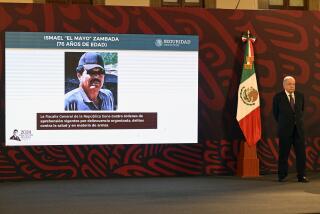Gunmen Kidnap Sanyo Executive in Tijuana
- Share via
SAN DIEGO — Gunmen seized a top Japanese executive at a Tijuana park Saturday and were demanding $2-million ransom in what is believed to be the first kidnapping of a foreigner connected to the city’s booming maquiladora industry, company officials said Monday.
Observers say the kidnapping of Mamoru Konno, who heads Sanyo Video Components in Tijuana, is expected to heighten security concerns among Japanese firms doing business in Mexico’s maquiladoras, especially if Konno is harmed. Maquiladoras are the foreign-owned plants along the border where goods are assembled for foreign sale, mainly in the United States.
Konno, 56, was leaving a company baseball game Saturday afternoon at the La Presa municipal park, about 10 miles east of downtown Tijuana, when several gunmen detained him and spirited him away in front of witnesses, sources said.
The gunmen made two calls--at 8 p.m. and 9:30 p.m.--to a Sanyo aide in San Diego demanding the $2-million ransom, Sanyo officials in Japan said. Konno’s abductors threatened that “he’s going to die if you contact the police or media,” a Japanese Foreign Ministry source said. Konno then got on the phone and confirmed that he had been kidnapped, Sanyo officials said.
Sanyo Vice President Alan Foster said at a news conference here Monday that the company was prepared to pay the ransom. “We’ll do whatever it takes to get our president back,” Foster said.
There has been no further communication from Konno or his captors, Sanyo executives said Monday at the company’s San Diego offices.
Sanyo had tried to keep news of the abduction quiet to negotiate with the captors but confirmed the abduction Monday after word leaked out in Japanese and Mexican news reports.
Tijuana maquiladora officials also were mum on the kidnapping, with several saying the industry is afraid that it will attract the attention of other potential kidnappers.
“Nobody wants to draw attention to it,” said Tony Ramirez, vice president of Made in Mexico, a San Diego-based maquiladora consulting firm who is also a board member of the Mexican national maquiladora trade group.
The semipublic NHK-TV network reported in Tokyo today that Mexican state police are investigating the possibility that a disgruntled Sanyo employee working at the Mexican factory assisted the kidnappers.
Officials at the Baja California state police and the Baja California attorney general’s office, who normally handle kidnapping investigations, said they had no details about the kidnapping to release. Attorney general spokesman Bernardo Cisneros said that, to the best of his knowledge, it was the first kidnapping of a foreign executive in the border city.
Although kidnappings of foreign executives are not uncommon in Mexico City and other large Latin American cities, the few kidnappings in Tijuana that have become public knowledge had been limited to wealthy residents. In Tijuana, the cases typically never make the news and are settled between the perpetrators and the hostage’s family.
Japan-based Sanyo is part of the booming agglomeration of Asian television manufacturers in Tijuana that now make 6 million television sets a year, or 25% of the total sold annually in the United States. Sony, Hitachi, Panasonic, Gold Star and Samsung are some of the TV brands made in Tijuana.
Japanese and other Asian electronics firms have rushed to Tijuana and other Mexican border cities in recent years to comply with North American Free Trade Agreement provisions that require manufacturers to make goods in North America to avoid tariffs. Also drawing them is the cheap cost of labor, made even more attractive by the 1994 peso devaluation.
Another element of Tijuana’s appeal for Japanese firms is that executives can easily cross to Mexican factories from San Diego, where most make their homes. Kanno lives in San Diego and visited the Tijuana factory daily.
Up to now, Tijuana has been viewed as a safe environment for the growing contingent of foreign executives. But Konno’s abduction will make the about 8,000 foreigners who cross the U.S.-Mexico border every day to work at the maquiladoras think twice.
“The kidnapping will raise some serious concerns on the part of the companies there,” said Henry Ota, a Los Angeles attorney who represents the Japan Business Assn. of Southern California, a group of Japanese firms. “Security has always been a No. 1 issue for Japanese executives wherever they do business.”
One San Diego consultant who assists Japanese firms opening plants in Tijuana described the kidnapping as a shock.
“The Japanese think it can only happen in big cities. . . . This will significantly affect the image of maquiladoras,” said the consultant, who asked that his name not be used.
Sanyo officials said Konno is married, has worked in San Diego for seven years and has been with the electronics company for 30 years.
Konno, like other executives dispatched overseas, had received training in crisis management and safety precautions, Sanyo officials said. But the executive apparently moved fearlessly in Mexico, without security guards, and had never before been followed or threatened, officials in Japan were quoted as saying.
“Konno studied the language on his own and plunged into the local area,” one Sanyo official told the Japanese media. “Such actions turned out to be the cause of his harm.”
Japanese firms account for 6% of the 750 maquiladoras in Tijuana, Ensenada and Tecate, but make up about 15% of total employees, or 20,000 of the 128,000 total maquiladora payroll.
Konno is president of Sanyo Video Components, which employs 1,200 workers in plants that manufacture television and videocassette recorder components.
Overall, Sanyo has six divisions and 5,000 employees in Tijuana, and 350 employees in San Diego.
Bruce Goslin, a director of Kroll Associates, a Miami-based international security company, said there are no reliable statistics on kidnappings in Mexico. Many people are afraid to report abductions, he said, for fear that they will be kidnapped again or that the police are corrupt.
Between 10,000 and 15,000 ransom kidnappings occur worldwide every year, said Brian Jenkins of the Los Angeles office of Kroll Associates, which has negotiated the release of kidnap victims.
“It’s a worldwide problem, but two-thirds of the kidnappings are in Latin America and concentrated in Colombia, No. 1, Brazil and increasingly in recent years in Mexico,” Jenkins said. “The No. 1 target category is usually local individuals of perceived wealth and in second place are local managers of multinational firms.”
Times staff writers Teresa Watanabe in Tokyo and Mary Beth Sheridan in Mexico City contributed to this report.
More to Read
Sign up for Essential California
The most important California stories and recommendations in your inbox every morning.
You may occasionally receive promotional content from the Los Angeles Times.













